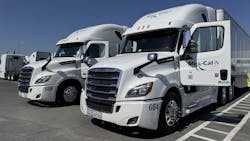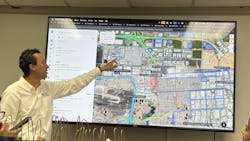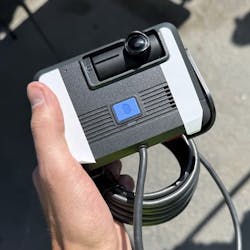Cali. fleet's telematics investment pays off for cross-border operations
SAN DIEGO–At Mex-Cal Truckline, a transportation and logistics company located just north of the Mexican border, security is paramount. Security not just of their customers' goods or their drivers, but of the border itself. The family-owned trucking company ships all over the U.S. and into Mexico, and cross-border logistics require careful planning and preparation.
Over the past few years, Mex-Cal has utilized Samsara's diverse array of fleet management and safety software and hardware offerings to the fullest, optimizing their security, driver safety, route planning, and more.
They also have an advantage when it comes to maintenance, using Samsara's vehicle gateway device in combination with the diagnostics features included in the software platform to stay ahead of routine maintenance, keeping trucks on the road and extending life cycles.
Jason Curry, senior account executive at Samsara, introduced the vehicle gateway as the "brains of the whole operation," explaining that connecting it to the engine diagnostic port allows fault codes, mileage, and more from hundreds to thousands of vehicles to be displayed on the Samsara fleet management dashboard.
"It makes it really easy to automate [maintenance]," he said. "Get alerted 500 miles before that oil change is due, or tire rotations need to happen, and help plan better for if a vehicle does need to come off the road."
Staying connected
As a CTPAT (Customs Trade Partnership Against Terrorism) certified organization with U.S. Customs and Border Protection, Mex-Cal is eligible for benefits like reduced inspections and shorter wait times at the border, with access to a fast lane that takes about an hour and a half compared to the usual 3-4 hours in the regular lane. And operating in the area they do, Mex-Cal would be at a disadvantage without the certification.
“[Customers] ask us to be CTPAT certified. That's why we invest in this technology,” said Javier Rogel, chief innovation officer at Mex-Cal, explaining that Samsara is the only way to truly have eyes and ears on their 120 trucks and over 700 trailers at all times.
However, certification also means maintaining a higher level of supply chain security. Add to this that most of the company’s customers are transporting electronics and medical goods, and security needs to be top-notch to ensure that these expensive goods are safe.
The Samsara platform’s geofences allow Mex-Cal’s dispatch team to monitor the load as it moves around, which is especially helpful as it crosses into the U.S., Rogel noted.
“The customs area is cell phone restricted, so we don’t know that anything is happening,” he explained. “If the truck ends up leaving in 20 minutes, we know that something happened, and we go to our CTPAT agent and ask what happened to that truck.”
This then allows the company to communicate with the customer, keeping them updated and letting them know of any possible delays or holdups at the border.
Of course, their main focus is on the safety of their drivers and everyone else on the road.
“In the end, security is for not just for the company, but for everybody that's on the road,” Rogel said. “It’s a way of making sure that we are safe.”
Tech and hardware
Some of the Samsara hardware utilized by Mex-Cal includes the AI dash cam, asset gateway, vehicle gateway, engine immobilizer, and panic button, making them a true multi-product customer of the fleet management and safety provider.
And when it comes to driver training, the in-cab technology has been critical in reducing poor behaviors. Use of cell phones, seatbelts, and distracted driving are all areas that Rogel explained have improved significantly since implementing Samsara's AI dash cams.
The driver-facing camera also provides an extra layer of protection for both the driver and the company when it comes to drug smuggling, which is a known issue around the border. Since the driver is monitored, the camera ensures that “nobody hands something to him, or brings any kind of irregular packages [into the cab],” Rogel posed.
Another Samsara product, the engine immobilizer, ensures that drivers maintain compliance with the company, given the high stakes of crossing the border. Because, as Rogel explained, Mex-Cal is 100% liable for any drug contamination or other issue with any load during customs inspection.
Fleet managers are able to remotely immobilize the truck, forcing the driver to sort out any potential violations before hitting the road.
About the Author

Lucas Roberto
Lucas Roberto is an Associate Editor for Fleet Maintenance magazine. He has written and produced multimedia content over the past few years and is a newcomer to the commercial vehicle industry. He holds a bachelor's in media production and a master's in communication from High Point University in North Carolina.



